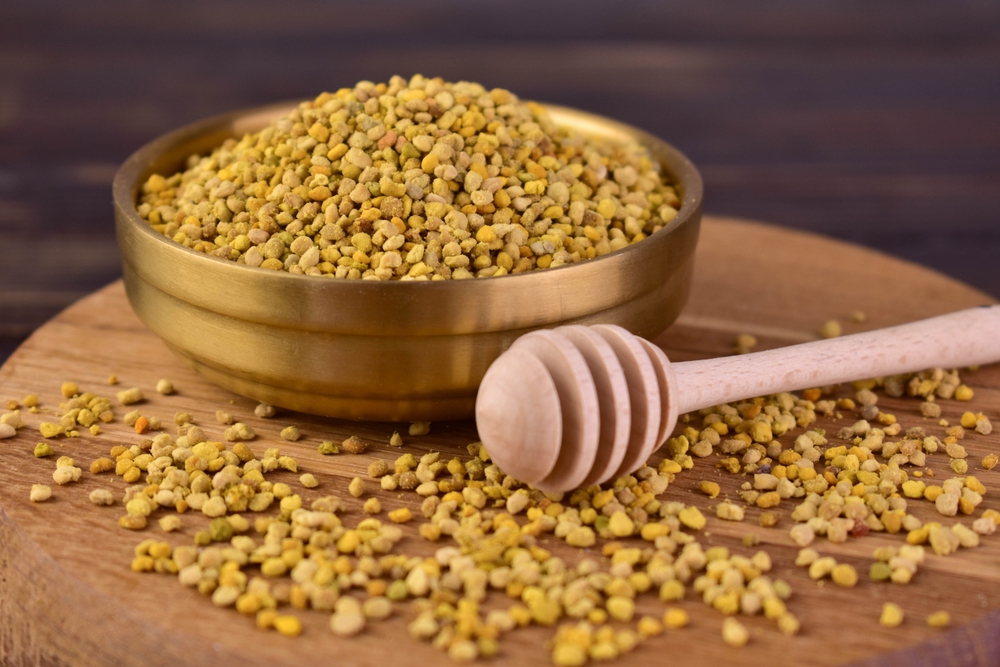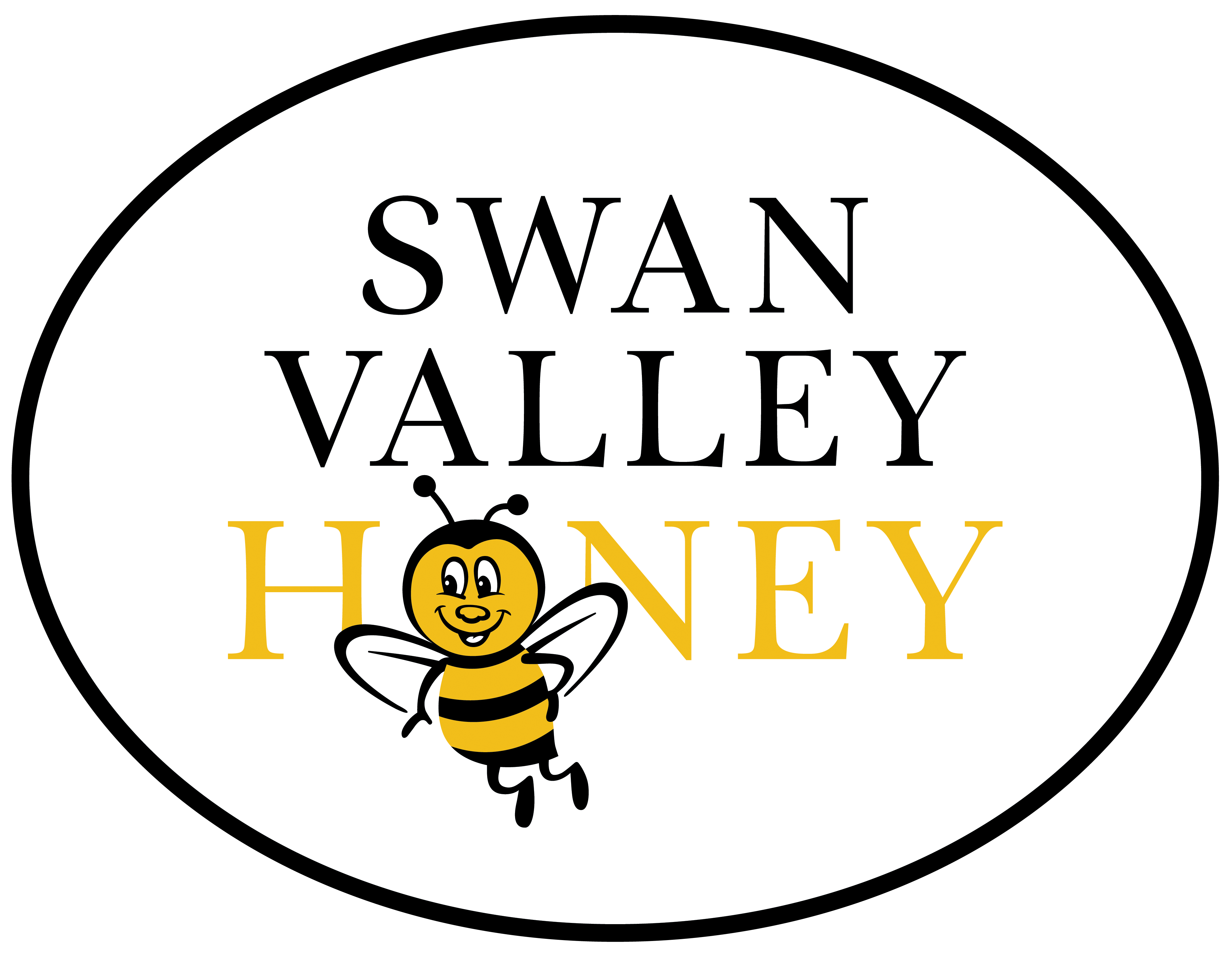Discover the Amazing Health Benefits of Bee Pollen | Shop now at Swan Valley Honey

Have you ever wondered what makes bee pollen the buzzword in the health world?
This tiny golden granule, collected by bees from flower pollen, is creating a big stir among wellness lovers. Surely for a good reason. Bee pollen contains vitamins, minerals, antibiotics, and antioxidants. Thus, it has earned its place as a superfood with potential health benefits.
Here’s your guide to explore the health benefits of bee pollen. We’ll discover what makes it so special and why more people are adding it to their daily routine.
Let’s start with the basics.
What Is Bee Pollen?
Bee pollen is a natural substance made by honeybees when they collect tiny grains of pollen from flowers. The bees mix this pollen with a bit of nectar, enzymes, and honey, forming small, golden pellets. These pellets are brought back to the hive as a food source for the bee colony, especially for growing young bees.
Now, don’t confuse bee pollen with natural honey, royal jelly, bee venom, or honeycomb. They all come from our buzzing friends. But they’re totally different in how they’re made and what they’re used for. Bee pollen is a category of its own.
Bee Pollen’s Nutritional Profile:
In its raw form, bee pollen looks like small, crunchy nuggets. Just one tablespoon is surprisingly powerful. It contains:
| Nutrient | Amount per 1 Tbsp (Approx. 15g) |
| Calories | 16 |
| Fat | 0.24 grams |
| Protein | 1.2 grams |
| Carbohydrates | 2.18 grams |
| Nutrients (Total) | Over 250 (Vitamins, minerals, antioxidants) |
You can sprinkle bee pollen over yogurt, oatmeal, smoothies, or blend it into baked goods. It also comes as a powder or bee pollen supplement capsule for convenience.
How Much Bee Pollen Should You Take Per Day?
Everyone’s body is different. But here’s a general guide to bee pollen dosage:
- Children: 1–2 teaspoons (around 15g) per day
- Adults: 3–5 teaspoons (roughly 20–40g) per day
Now that you know what it is, let’s explore the bee pollen benefits & why it’s being touted as one of nature’s most powerful food
12 Potential Health Benefits of Bee Pollen
1. Bee Pollen is a Powerful Antioxidant with Potential Protection Against Chronic Diseases
Touted bee pollen is packed with a wide range of antioxidants. Including flavonoids, carotenoids, quercetin, kaempferol, and agglutination. These antioxidants are your body’s first line of defense against free radicals, harmful molecules that can cause damage to cells and lead to chronic diseases like cancer and type 2 diabetes (Source: scijournals.onlinelibrary.wiley.com).
A 2015 study discovered that the antioxidants in bee pollen could help reduce chronic inflammation, fight harmful bacteria, and even slow down tumor growth (Source: onlinelibrary.wiley.com).
And in a more recent 2021 study, researchers found that the bioactive compounds in bee pollen can help prevent and manage chronic conditions like diabetes, obesity, heart complications, and metabolic disorders (Source: ncbi.nlm.nih.gov/).
While these findings are promising, more research is needed to better understand the role of bee pollen in disease prevention.
2. Bee Pollen is Packed with Over 250 Nutrients to Fuel Your Body
One of the reasons bee pollen is considered a superfood is because it’s loaded with over 250 biologically active substances. These include:
- Vitamins
- Minerals
- Antibiotics
- Antioxidants
- Proteins
- Carbohydrates
- Lipids
- Fatty Acids
- Enzymes
That’s a lot of nutritional power in those tiny granules. (Source: ncbi.nlm.nih.gov).
Interestingly, the nutritional content can vary depending on the season and where the pollen is collected. For example, springtime bee pollen may have a different amino acid profile compared to pollen collected in summer.
So, no matter when or where it’s harvested, you’re getting a unique blend of nutrients to nourish your body.
3. Bee Pollen Can Help Lower Heart Disease Risk Factors
Did you know that heart disease is the leading cause of death worldwide?
High blood lipids and cholesterol are both major risk factors for heart disease. That’s where bee pollen can play a role in protecting your heart health.
Studies have shown that bee pollen extracts may help lower blood cholesterol levels, especially LDL (the “bad” cholesterol) (Source: 2017 Study).
Additionally, the antioxidants in bee pollen can help protect lipids from oxidation. When lipids oxidise, they can stick together, blocking blood vessels and increasing the risk of heart disease (Source: 2018 Study).
By adding bee pollen to your diet, you may be taking a natural step to protect your cardiovascular health.
4. Bee Pollen Has Natural Anti-Inflammatory Properties to Relieve Swelling and Pain
Traditionally, bee pollen has been used to reduce inflammation and swelling.
Research supports this, with studies showing that the compounds in bee pollen. Especially antioxidants like quercetin can lower the production of inflammatory fatty acids (Source: 2015 Study).
A study discovered that bee pollen from specific sources, like acorn and kiwi, showed strong anti-inflammatory and antioxidant effects. Researchers believe that bee pollen could potentially replace common anti-inflammatory drugs (NSAIDs and corticosteroids) (Source: 2024 Study).
The antioxidants in bee pollen help to suppress biological processes that lead to inflammation. Thus, offering a natural alternative to synthetic treatments.
5. Supports Liver Health by Protecting Against Toxins and Disease
Your liver plays an important role in detoxifying your body by filtering out harmful substances from your bloodstream. Bee pollen can be your liver’s best friend in this process.
Research suggests that bee pollen can help protect your liver from damage caused by various toxic substances. It can even combat diseases like hepatitis and nonalcoholic fatty liver disease. (Source: 2021 study)
Not only does bee pollen have antioxidant properties that can help safeguard the liver. But a study found that it may also support liver healing (Source: 2016 Study).
While these animal studies show promising results, more human-based research is needed to fully understand how bee pollen impacts liver function in humans.
6. Bee Pollen Has Potential Cancer-Fighting Properties
Cancer is a disease that involves uncontrolled cell growth. While no natural remedy should be considered a cure-all, bee pollen can have some potential in the fight against cancer.
Research, including studies from 2013 and 2017, has shown that bee pollen extracts can inhibit the growth of tumors and promote apoptosis (the process where damaged cells naturally die off) in several types of cancer. Such as prostate, colon, and leukemia. (Source: spandidos-publications.com).
Bee pollen from plants like Cistus incanus and Salix alba can even have anti-estrogenic effects. This could help lower the risk of hormone-related cancers such as breast, prostate, and uterine cancers.
Although the findings are promising, more human studies are needed to better understand the role of bee pollen in cancer prevention.
7. Boosts Immunity and Fights Harmful Bacteria
Bee pollen isn’t just great for your health. It can also be a powerful tool for boosting your immune system.
Several studies have confirmed its ability to strengthen your body’s defenses. A review of multiple studies found that bee pollen exhibits strong antimicrobial properties. This makes it effective at fighting off harmful bacteria. (Source: 2021 Study)
In lab studies, bee pollen has been shown to kill bacteria like E. coli, Salmonella, Pseudomonas aeruginosa, and even those responsible for staph infections. By adding bee pollen to your routine, you can potentially enhance your body’s ability to ward off illness and keep harmful bacteria at bay.
8. Helps with Wound Healing and Infection Prevention
If you’ve ever had a scrape, burn, or other wound, you know how important it is to promote healing and prevent infections. Bee pollen, with its anti-inflammatory and antioxidant properties, can help speed up this process.
A study on animal models showed that bee pollen is effective at healing burn wounds, just like silver sulfadiazine, a commonly used burn treatment, with fewer side effect (Source: 2016 Study).
Another study discovered that propolis, another product from bees, aids in the healing of trauma and surgical wounds by promoting skin regeneration, reducing scar formation, and even providing pain relief (Source: 2022 Study).
Thanks to its antimicrobial properties, bee pollen may also help prevent infections, making it an excellent natural remedy for supporting wound healing.
9. Can Serve as a Dietary Supplement for Better Health
Bee pollen is an excellent addition to your diet as a supplement.
Studies have shown that bee pollen may have some impressive health benefits. For example, a study involving rabbits that took bee pollen alongside their regular diet found that they lived longer and had healthier, stronger offspring compared to those who didn’t get the supplement (Source: 2021 Study).
Another study looked at malnourished older rats. They found that after consuming bee pollen, they experienced improvements in muscle mass and metabolism. It’s exciting to think that something so natural could help boost health in so many ways (Source: ncbi.nlm.nih.gov/).
10. Can Help Ease Menopausal Symptoms Like Hot Flashes
For women going through menopause, symptoms like hot flashes, mood swings, and sleep disturbances can be tough to manage. Thankfully, bee pollen might offer some relief.
A study found that 71% of women with breast cancer felt better after taking bee pollen to manage their menopause symptoms. (Source: 2015 Study)
In addition, a study suggested that combining bee pollen with propolis and royal jelly could effectively ease menopausal discomfort. While the results are promising, more research is needed to confirm just how beneficial bee pollen is for menopause (Source: 2020 Study).
11. Safe and Easy to Add to Your Daily Routine
Bee pollen is easy to add to your diet and generally safe for most people. You can find it in granule or supplement form at health stores or even from your local beekeeper. The granules can be sprinkled over yogurt, stirred into smoothies, or added to breakfast scrambles for an extra health boost.
However, if you’re allergic to pollen or bee stings, you’ll want to avoid bee pollen, as it could cause allergic reactions.
It’s also important to know that bee pollen may interact with blood thinners like warfarin, so check with your doctor if you’re on medication. Also, it’s best to avoid it if you’re pregnant, breastfeeding, or if your child is under 2 years old, as there’s not enough research to confirm it’s safe for these groups (Source: ncbi.nlm.nih.gov).
12. Can Help Reduce Stress and Fatigue
Feeling stressed or tired? Bee pollen could be a natural solution.
Bee pollen has been shown to increase blood flow to the nervous system. This can help reduce stress and fight off fatigue. It’s a simple way to feel a little more energized and at ease throughout the day (Source: ncbi.nlm.nih.gov ).
Conclusion: Is Bee Pollen Worth Adding to Your Routine?
Absolutely! The many benefits of bee pollen make it a natural and worthwhile addition to your diet. Packed with vitamins, minerals, and antioxidants, it’s a nutrient-rich superfood that can easily be incorporated into your daily routine.
While research on bee pollen is still growing. Existing studies suggest it can help reduce inflammation, enhance immunity, and support wound healing. That said, more human studies are needed to fully confirm its health benefits.
As always, if you’re pregnant, breastfeeding, or have allergies, be sure to consult your healthcare provider before trying bee pollen.
Wondering where to find high-quality bee pollen in Western Australia?
Try Swan Valley’s Bee Pollen Today | Sweeten Your Health Naturally
At Swan Valley Honey, we offer premium bee pollen, collected from unpolluted and unpopulated areas of Western Australia and dried at temperatures not exceeding 40°C for full vitamin retention.
We deliver 100% pure and raw honey—straight from the beehive to your table.
Explore our range of product containing bee pollen, premium honey, and other natural treats.
